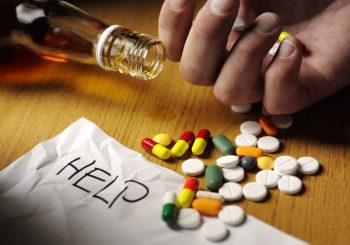 By Mateo Sol
By Mateo Sol
Guest writer for Wake Up World
Every form of addiction is bad, no matter whether the narcotic be alcohol or morphine or idealism. – Carl Jung
I have much to thank drug abuse for.
At the moment I entered this planet, I was born with an inherited heroin dependency that formed in the womb due to my addict mother. Throughout the rest of my early life, I observed the physical and psychological effects drugs had on both of my parents. It was these early exposures to drug abuse that awakened within me the desire to understand human nature.
As I grew older and moved to live with other family members, I realized that although my exposure to drug abuse wasn’t there anymore, each person in my life seemed to develop different forms of addiction as a way of coping with the emptiness of life and the longing for more.
The Heart of Addiction
I have absolutely no pleasure in the stimulants in which I sometimes so madly indulge. It has not been in the pursuit of pleasure that I have periled life and reputation and reason. It has been the desperate attempt to escape from torturing memories, from a sense of insupportable loneliness and a dread of some strange impending doom. – Edgar Allan Poe
In these words, Poe so eloquently describes the basic heart of drug abuse.
And what Poe has pointed to here isn’t just the cause of drug abuse, but every kind of abuse and addiction. Whether your addiction is to food, sex, consumerism, work, angry outbursts or video games, underneath every addiction is the pursuit of control or power, and the wrong idea that power lies externally somewhere in the environment or in other people.
Our struggle with control and power is at the center of our ego’s perception of reality and the misguided beliefs about how to acquire power, how to overcome our lack of it, what it really is, and who should have it. Behind every personal crisis is the natural desire to control the chaos we’re experiencing. Emotionally, spiritually, physically, and psychologically, we find power by avoiding our problems with distractions or giving our problems meanings.
What the addict is seeking is nothing to be ashamed of. The lonerwolf community and the whole spiritual world is trying to reach that same blissful state of consciousness. But this divine state of consciousness doesn’t have to be sought after externally, it’s always within you.
Your susceptibility to addiction depends upon the mental lens that you wear to interpret your crisis. Are you going to step closer to your Soul or closer to the ground?
3 Surprisingly Common Causes of Drug Abuse
It’s important for us to understand that often our addictions are not only cravings for greater depth of consciousness and bliss, but also ways of alleviating us from experiencing our core wounds and burdens from the past.
When we are drinking ourselves into a stupor, chain-smoking to relieve anxiety, shopping for a few more accessories that we don’t really need on Etsy, or popping a few extra pills than the doctor prescribed, we are often completely unaware that these “addictions” may actually be the symptoms of our unconscious minds trying to avoid dealing with something much deeper.
As I’ve previously written about in my Soul Loss article, our Souls are infinitely wise and in order to survive and cope with certain events that we’re not prepared for, we will lose touch with them through protective mechanisms, until we’re ready to pull down these walls again.
This Soul “loss” is a way of protecting us; it’s a psychological strategy which often manifests itself as addictions, obsessions, self-harm, escapism, self-numbing, delinquency, and recklessness. In this way, we defend ourselves from overwhelming emotions and intolerable or painful bodily states.
Drugs are not just substances; they can be anything which has a physiological effect on us. Anything that provides us with a form of escape or control over the internal chaos, emptiness, isolation, uncertainty and fear we experience, is a drug.
It’s only as we soulfully mature, that we gradually become conscious of our automatic-pilot habits and recognize our repetitive and compulsive behaviors. It’s only by committing ourselves to our inner work, developing space and distance between our egos and our conscious Self, and exploring the deepest corners of our Souls, that we may uncover much of the baggage that causes our drug abuse.
The causes of drug abuse are one and the same: finding a sense of control in the powerless or emptiness that we feel. What’s more important is recognizing how this is done, to allow us to begin changing it.
In the following list, I’ll share with you three types and causes of drug abuse. See whether you can resonate with any:
Escapism
When we are presented with a physical threat, what is our first reaction? Usually, we will choose to run and distance ourselves as much as possible from the danger.
The same is true with mental and emotional threats. Our minds, in order to protect us, will prevent us from registering, remembering, and often fully feeling traumatic events.
An example was a student of ours who lost her child in an accident, became an alcoholic and eventually lost her marriage because of her addiction. It’s only once she stopped avoiding her pain and learned how to truly grieve for the loss of her child and husband, that she was able to build the willpower to stop drinking.
Another example of escapism is often seen through fantasy, as is the case with many video games and book addicts who mute their Soul’s calling by escaping into wondrous and make-believe worlds.
Numbing
If we choose not to escape, the next best next thing is numbing what we feel. Addictions help to distract and numb ourselves in order to avoid the emotionally painful precincts of our lives.
Although addictions can be anything, the most abusive and difficult to stop addictions are those with a chemical root. Drug and alcohol addictions not only create a physiological dependency that numb our capacity to feel, but they also change our behavior and ability to make full use of our will power.
By distracting and numbing ourselves, we are cut off from our full range of emotions, feelings, sensations, memories, and volition. Not only does addiction remove us from experiencing intolerable pain (emotional, physical or spiritual) but it also gives us a temporary state of blissful peace or joy. Trying to stop using numbing drugs not only takes these things away, it also creates physical cravings and pains making it all the harder to quit.
Seeking
A few years ago I read a book called The Peter Pan Syndrome: essentially, an adult with a Peter Pan syndrome unconsciously decides to never get old as a way of avoiding responsibility and facing adult difficulties.
Carl Jung had a similar concept within his archetypes system which he called the Puer aeternus (or “eternal boy”) based on the mythology of the child-god who is forever young.
This form of avoidance in growing up and meeting the challenges of life face-on often leads to addictions when the person feels incapable of taking responsibility for his/her life. We all witnessed the fate of Michael Jackson as he grew up too quickly in the spotlight.
The addictive pattern of seeking can often be seen within thrill seekers and sex addicts who attempt to live a life of endless adventures and excitement that will fill the empty void within. Such thrill seekers also have an intense aversion to anything of real depth, and always focus on shallow pleasures.
But seeking is also surprisingly prominent in the spiritual community, especially as a form of Spiritual Bypassing, where many seekers who fixate on the “light” avoid their own shadow selves and try to only think through the lens of positivity and understand the ego as something to be destroyed.
5 Powerful Steps to Heal From the Heartbreak of Addiction
When we avoid the realities of our lives, we’re not only destroying our personal potential, destiny and the invaluable qualities we have to contribute to the world, but we’re also giving up on our deep capacity for personal fulfillment.
What’s worse, what may have initially been a technique of self-protection to shelter you from certain wounds growing up, can result in further woundings by your consumption of substances. Not only are we at risk of social rejection because of this behavior, but such addictions can even lead to medical disabilities.
My suggestion for overcoming addictions is to always seek the support of someone (either a community or specialist) who is trained in such behaviors. It’s very difficult to overcome your addiction when you’re alone, enslaved to the subjective perspective of your addiction, and with no one outside of yourself to guide you.
Once you’ve found a strong social support network that you feel you can trust, you can attempt the following steps.
1. Recognizing Your Addiction
You cannot begin the work of releasing an addiction until you can acknowledge that you are addicted. Until you realize that you have an addiction, it’s not possible to diminish its power. It’s very easy for our minds to rationalize our addictions, dress them in attractive clothing, tell yourself it’s desirable or even beneficial (how many alcoholics say it’s a way of loosening up, relaxing after work, or having fun?).
2. Abstain From the Behaviors Involved in Your Addictions
This is much easier said than done. This is where the support from others comes in handy, especially for substance addictions that are accompanied by compulsions and cravings.
This step won’t cure your addiction, but it will stop the behaviors. The cravings and compulsions will gradually diminish as you continue with the next steps. You might relapse in this step, and it’s OK, just repeat the first two steps and seek support for this step as you move on to the next.
Stopping addictive behavior for a few days and even weeks might prove easy – it’s longer than that which will be your biggest challenge.
3. Explore and Heal Wounds Your Addiction Was Protecting You From
As you stop the substances and addictive behaviors that distance you from being able to listen to your Soul, others, and existence, you’ll notice that waves of emotions, memories, and realities begin arising within your awareness. You might be tempted to escape, but stay firm in your resolve.
You might notice, for example, that you were numbing your low self-esteem wound that previously made you feel utterly unworthy, unwanted, shameful, or faulty. This is the part where you begin applying what you’ve learned through your Inner work: nurturing, acknowledging, embracing, and empathizing with this pain.
For example, you might start asking; Where is this pain rooted in your body? How were you treated as a child, and what were you told about yourself? How did holding on to this emotional self-abuse serve you (e.g. maybe it helped you to “fit in”)?
As you learn to sustain awareness and navigate through your previously hidden traumas, you’ll notice the strength of your old compulsions and routines becomes less and less powerful. Fewer situations will be able to trigger these habits which will reduce your chances of a relapse.
4. Create a Ritual of Gratitude Toward Yourself
Although we may perceive our protective mechanisms as responsible for our addictions, in fact, they deserve much gratitude.
It’s not our protective mechanism’s fault that we found ourselves in situations and circumstances which were traumatizing for us. Even though we paid a heavy price for these protective mechanisms, that was the best way we knew how to deal with our pain in that particular moment, to mentally or emotionally survive.
Now that you have grown and matured, you can thank your protective mechanism for helping you to avoid such painful experiences until you were psychologically ready to work through them, as you are now. A small ritual like writing a thank you letter acknowledging all they helped you get through is very helpful.
5. Replace Your Old Routines With New Ones
There is a Golden Rule of habit change that studies after studies have shown work successfully in creating change. The Golden Rule states that every habit has three components: a cue (or a trigger for an automatic behavior to start), a routine (the behavior itself), and a reward (which is how our brain learns to remember this pattern for the future.)
The Golden Rule has influenced treatments for alcoholism, obesity, obsessive-compulsive disorders, and hundreds of other destructive behaviors, and understanding it can help anyone change their own addictive routine. I recommend that you read The Power of Habit if you’re struggling with addiction and habit change.
You can never truly extinguish bad habits. Instead, to change a habit, you must keep the old cue, and deliver the old reward, but insert a new routine. For example, if you smoke when you get stressed, you shouldn’t try to “just stop smoking” when that happens. Instead, you should come up with a different way to deal with stress and insert that new behavior (having a quick meditation session, chewing gum, having a tea, etc.) instead of having a cigarette.
Your addiction is not stronger than you or who you want to be. It might feel that way right now, but it can only beat you if you let it. No weakness is stronger than our Soul or the force behind our will.
The strength that we feel our addiction has is only an indication of the amount of effort that needs to be applied towards reconnecting with your wholeness again by listening to the whispers that have been muted for so long.
You are more powerful than you know.
Recommended articles by Mateo Sol:
- 12 Signs You’ve Lost Your Authenticity and are “Selling Out”
- 6 Signs You’re Experiencing Spiritual Maturity
- How To Induce a Trance State for Deep Psychospiritual Work
- Why Our Political Instability Will Continue, and Crisis is OK
- 11 Traps Sabotaging Your Spiritual Growth
- Spiritual Sex: 3 Types of Divine Union
- 6 Powerful Solfeggio Frequencies that Raise Your Vibration
- Hypnagogia: The Trippy Mental State That is the Key to Deep Self-Discovery
- Signs and Omens: Listening to the Messages of Spirit
- 21 Signs You’re Experiencing “Soul Loss”
- Soul Retrieval Can Heal Addiction, Trauma and Mental Illness – Here’s How
- 8 Different Types of Love According to the Ancient Greeks
- Why You Need to Forget Positivity, Keep Your Ego and Embrace Your Darkness
About the author:
Mateo Sol is a prominent psychospiritual teacher whose work has influenced the lives of thousands of people worldwide. Born into a family with a history of drug addiction, schizophrenia, and mental illness, Mateo Sol was taught about the plight of the human condition from a young age. As a spiritual guide and teacher, Sol’s mission is to help others experience freedom, wholeness, and peace in any stage of life. See more of his work at lonerwolf.com.
This article, What Are the Underlying Causes of Drug Abuse?, was originally published on lonerwolf.com, reproduced with permission.

If you've found value in our articles, we invite you to support the release of our brand-new book, "Gratitude Practices for Kids: A Practical Guide for Adults to Instill a Spirit of Appreciation and Positivity in the Next Generation."
"Gratitude Practices for Kids" brings together over 25 innovative and accessible practices designed to enhance gratitude in everyday life. This comprehensive guide is backed by 17 scientific studies, ensuring each concept is grounded in research, underscoring our commitment to nurturing growth, emotional intelligence, and positive interactions between adults and children.
We encourage you to opt for the paperback version to celebrate this new release. Dive into its fresh pages away from digital distractions, allowing you to immerse yourself in the transformative practices it offers.
Over recent years, Wake Up World has faced significant online censorship, which has impacted our financial ability to operate. Moving into book publishing represents a strategic step to secure the ongoing funds needed to continue our mission. By purchasing Gratitude for Kids, you help us keep our content free and accessible to everyone, avoiding needing a paywall. With over 8,500 articles published in the last 13 years, we remain dedicated to keeping our valuable content open to all.








